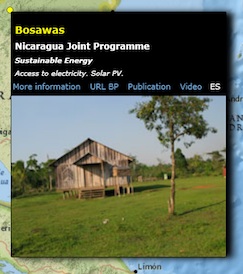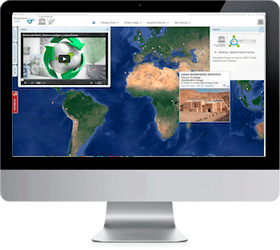Nicaragua Joint Programme - Empowering communities.
 The Nicaragua Joint Programme implemented its project in the Bosawas Biosphere Reserve in close collaboration with indigenous communities dispersed along rivers, in remote, difficult to access mountainous terrain, covered by tropical rainforest. Vulnerabilities related to extreme weather events, such as torrential rains, hurricanes, made local community members prioritise access to safe drinking water, sanitation and electricity high on their agenda during the long and thorough participatory needs-assessment.
The Nicaragua Joint Programme implemented its project in the Bosawas Biosphere Reserve in close collaboration with indigenous communities dispersed along rivers, in remote, difficult to access mountainous terrain, covered by tropical rainforest. Vulnerabilities related to extreme weather events, such as torrential rains, hurricanes, made local community members prioritise access to safe drinking water, sanitation and electricity high on their agenda during the long and thorough participatory needs-assessment.
Under one of the programme’s initiatives, solar panels were installed in households, empowering families not only to manage their own resources, but also to work together to generate a community fund to maintain the power system. Contributions to the fund are collected monthly in each of the seven participating communities. As part of the effort to increase women’s participation in decision-making, 70% of the committee which manages the fund is made up of women. In addition, community leaders were trained in maintenance, so that if panels fail, the communities themselves can repair them.
A comprehensive participatory diagnosis and feasibility study revealed that the energy source preferred by local people, i.e. independent off-grid photovoltaic systems for individual households, could provide renewable energy at low cost, with low environmental impact and low maintenance. The flexibility of solar units was particularly appreciated for matching indigenous cultural preference for dispersed settlements. Possibilities for other types of power generation were ruled out for the following reasons. Electricity through the national or regional grid was financially not feasible given the communities’ dispersed location. Wind was either inadequate to generate enough power in all locations or it was considered potentially destructive for wildlife. Hydro-power was inacceptable for cultural reasons as water was venerated and protected as protein source.
As a result of cross-scale and cross-sector collaborations, 276 off-grid photovoltaic systems were installed in seven communities in Waspam . Experts of the Ministry of Energy selected the latest solar technology that ensured 50 years lifespan with minimal maintenance. Each system is able to produce enough energy (240 Wh) to operate five light-bulbs per household for five hours at night. The unit cost of one photovoltaic system is about USD 1,000 including a battery and five blubs, with an extra USD 50 installation fee.
Families, schools and healthcare centres were equipped with photovoltaic solar systems. Owners of the solar systems – 40% of the energy-stewards are women – received training on how to operate and provide basic maintenance. The maintenance basically requires keeping the solar panels’ surface clean. The sense of ownership and willingness to maintain the system is critical to success, as external servicing would prove ineffective due to the remote locations.
Electricity has made immense improvement in education and healthcare, the two key sectors that form the basis of sustainable and resilient communities. For example, the solar installation made possible emergency healthcare at night and created opportunity for adult education, i.e. light for those who were keen to study in the evening hours. Striking improvement was in vulnerability related to extreme weather events. For example, last year (2011) the hurricane came and go without any diarrhoea case due to improved sanitation made possible by the photovoltaic power generation. This healthcare improvement was in sharp contrast with the high incidents of post-hurricane diarrhoea cases three years ago. Radios, cell-phones previously provided by a UNESCO project, can also provide more reliable informal and non-formal learning opportunities. Two communities have already expressed their interested in receiving internet-connection.
The transferability of this low cost, low environmental impact, low maintenance and gender-sensitive system was highlighted by several participants of the Elluminate session. The installation of decentralised energy sources increases dispersed communities’ resilience. This trend is in line with recent recommendation of world leading conservation organisations like the Sierra Club.
The Joint United Nations programme “Local and regional environmental management for the management of natural resources and provision of environmental services” was a collaboration between the Nicaraguan government and seven agencies of the United Nations (UNDP, UNESCO, UNIDO, UNEP, WHO, UNICEF and WFP). The programme targeted MDG 7, which seeks to ensure environmental sustainability.
Nicaragua-Bosawas Joint Programme (ES) PDF
EQUATOR INITIATIVE














